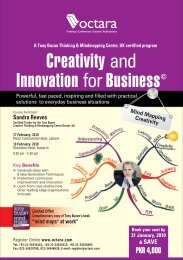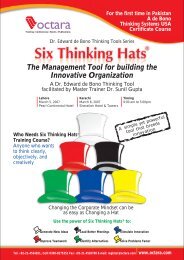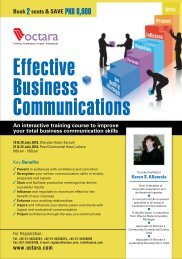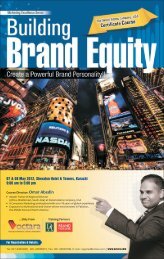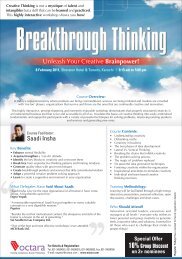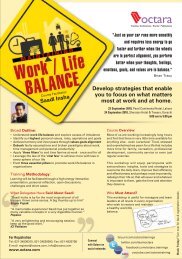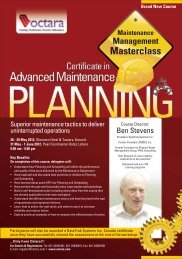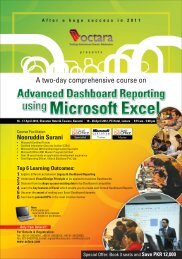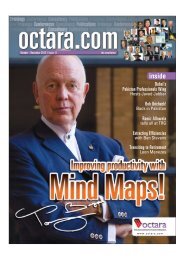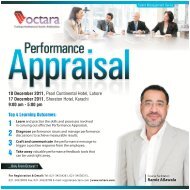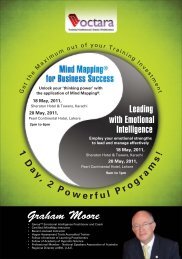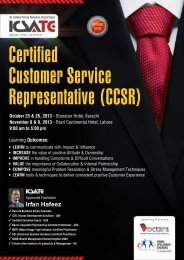Maintenance Excellence Series - Octara.com
Maintenance Excellence Series - Octara.com
Maintenance Excellence Series - Octara.com
Create successful ePaper yourself
Turn your PDF publications into a flip-book with our unique Google optimized e-Paper software.
Certified by DataTrak Systems Inc,CanadaCourse Director: Ben Stevens• President, DataTrak Systems Inc.• Former President, OMDEC Inc.• Former Consultant at Physical Asset Management Group, PWC Consulting• Over 25 years of cross-industry experience at key positions• Delivered well over 100 training programsApril 29 & 30, 2013 - Karachi | May 6 & 7, 2013 - LahoreMay 2, 3 & 4, 2013 - Karachi | May 8, 9 & 10, 2013 - LahoreJune 3, 4 & 5, 2013 - KarachiJune 6 & 7, 2013 - KarachiTo avail special discounts on booking, please see the registration details...Only from <strong>Octara</strong>!!!For Details & Registration:Tel: 021-34534261, 021-34536315, Fax: 021-34520708,E-mail: register@octara.<strong>com</strong> | www.octara.<strong>com</strong>Learning Partner
Optimizing <strong>Maintenance</strong> TacticsLogical Selection of <strong>Maintenance</strong> Tactics and their UsageApril 29 & 30, 2013 - Sheraton Hotel, Karachi | May 6 & 7, 2013 - PC Hotel, LahoreCourse Overview:The use of the correct maintenance tacticslays the foundation for effective deliveryof reliability. This two day program willexamine the logic behind the selectionand use of the right tactics, and show howto measure the results of employing them.Delegates will go through the basics ofreliability and equipment failure - focusingon understanding the underlying causesand their implication. Next delegates willexamine the various maintenance tacticsthat can be used, such as Condition Based<strong>Maintenance</strong>, Run to Failure, Time Based<strong>Maintenance</strong>, etc, what their impact is andhow they can best be selected.Key Learning Out<strong>com</strong>es: Understand different <strong>Maintenance</strong>Tactics and how they best fit the typesof equipments and equipment failures Learn how to select the right Tacticand when to use it to increase reliabilityand reduce cost Examine the underlying costmeasurement principles and how toapply them to your own maintenancebusiness Discover the key concepts inunderstanding & visualising failure,cost of failure and prevention of failure Review different types of performanceand failure curves & how to use themfor the benefit of the organization Understand the process of balancingthe risk and cost of failure with thecost of preventionCourse Agenda:Session 1:Introducing <strong>Maintenance</strong> Tactics1. Practical implications of maintenance alternatives2. How to convert static maintenance procedures intothe ultimate goal of Living Reliability3. Why do we care about Tactics4. How Tactics are fundamental to ContinuousReliability ImprovementSession 2:Selecting the RIGHT <strong>Maintenance</strong> Tactics for Best Results1. Linking Tactics with the <strong>Maintenance</strong> strategy2. Types of Tactics – Inspections, CBM, TBM, Redesign,Run to Failure, Detective/Corrective3. Laying the Foundation for Selection and use of<strong>Maintenance</strong> Tactics4. Tactics - their selection and use;a. Which tactic fits which failureb. Conditions to apply in selecting tacticsc. When is “run to failure” good maintenanced. Workshop – validating the rules for selecting tactics5. Frequencies and scheduling of tacticsSession 3:Impact of Tactics on Equipment Reliability1. How the right Tactics will improve equipment reliability2. Linking Tactics to Performance Curves & Failure Curves3. How Performance Curves and Failure Curves guide usto the right maintenance4. Why wrong tactics make things worse and cost moreSession 4:The Bottom Line in Tactics1. Measuring Tactical Effectiveness2. Risk and Cost of Tactics - Developing a cost structureto <strong>com</strong>pare the effectiveness of different tactics3. Best Practices in <strong>Maintenance</strong> Tactics - their selectionand use; which tactic fits which failure; conditions toapply in selecting tactics; when is “run to failure” goodmaintenance4. Best Practices in Preventive <strong>Maintenance</strong> - why PM’sare preferred, and when they are not5. Identifying and evaluating the costs of failure6. Value in <strong>Maintenance</strong>, the true objective of maintenance;introducing and measuring risk in maintenance7. Measuring the Costs of Prevention and Failure -preventing or allowing failure as a business decision;<strong>com</strong>paring the costs of different maintenance tactics
Understanding and Managing RCMUsing RCM to Select Tactics and Reduce Equipment FailureMay 2, 3 & 4, 2013 - Sheraton Hotel, Karachi | May 8, 9 & 10, 2013 - PC Hotel, LahoreCourse Overview:Many significant advances in equipmentreliability analysis in recent years havebeen based on RCM. This program willstart with a practical model of how RCMfits in with equipment reliability. Thecourse focuses on thorough review ofwhat RCM is and the process necessaryto put it into place. Traditional approachesto RCM carry a number of pitfalls anddifficulties that delegates will be introducedto - along with techniques to avoid them.Participants will gain an insight andexperience of RCM and the conditionsthat should surround it. Delegates willgain a solid understanding of RCM andhow to effectively use it by working thougha ten step process over the 2-day program.Delegates will work in small groups andwill focus on practical case studies so thatthe results can be applied in theirworkplace.Key Learning Out<strong>com</strong>es: Learn & practice RCM fundamentals Identify the pitfalls of RCM anddevelop strategies to avoid it Understand the process of planningand implementing RCM. Develop an understanding offunctional & potential failuresUnderstand how to turn RCM into Living ReliabilityComplement RCM with other maintenance techniquesCourse Agenda:Session 1:1. Introduction, history and role of RCM – the backgroundof RCM and how it fits into the range of tools availableto the modern Physical Asset Manager. Also, what itwill not do, and why many <strong>com</strong>panies RCMimplementation do not deliver the goods2. How RCM supports into Continuous <strong>Maintenance</strong>Improvement3. Identifying Critical Equipment and selecting targetequipment for RCM, practical techniques for selectingthe critical equipment4. Determining Equipment Functions - each asset isdesigned to perform specific functions. Examples forunderstanding these functions will be discussed whichwill prompt right action to prevent equipment failures5. Defining Failures is not simple - each function hasseveral different ways of failing and each may beimportant to reliability. Participants will developunderstanding of “Failure”, Functional Failures, PotentialFailure and Total failuresSession 2:1. Defining Failure Modes - once the functional failuresare identified, we need to define the process that resultsin the lost performance; i.e. what actually happens tothe machinery. Examples will continue to follow thepracticality of the delegates’ workplace2. Analyzing Failure Effects - Each failure mode can haveone or more ways of showing up; these will be definedand explored. Here we also apply the economic test -is it worthwhile taking any action?3. Selecting the right Tactics to prepare the Tasks - herewe use the Consequences of Failure and the RCM logictree to select the right tactic - which then is convertedinto a work order task4. <strong>Maintenance</strong> Tactics & their criteria for selection reviewSession 3:1. Implementing RCM - a step by step review of what ittakes - from training, to team selection, roles and tasks2. RCM and KPI’s - Measuring progress towardsimplementing RCM, Measuring the success of RCM3. Beyond RCM to Reliability - a summary of how RCMshould be integrated with other tools and concepts toensure its effective use4. An introduction to Living Reliability - keeping the RCManalysis fresh anduseful, andextending it toform the basis forContinuous <strong>Maintenance</strong>Improvement
Effective Project Management for <strong>Maintenance</strong>Key <strong>com</strong>ponents of successful Projects and their Inter-relationJune 3, 4 & 5, 2013 - Sheraton Hotel & Towers, KarachiCourse Overview:Demands on <strong>Maintenance</strong> Departments arenow be<strong>com</strong>ing more and more <strong>com</strong>plex -whether it be building and installing newcapacity, managing shutdown maintenanceor managing <strong>com</strong>plex rebuilds. The demandsshow themselves in the requirement tostrictly control costs while improving quality,project turnaround and reducing risk.The focus of this course is to apply ProjectManagement best practice techniques to the<strong>Maintenance</strong> environment. Through a well- planned series of presentations anddiscussions, delegates will be exposed tothe best practices in project management,and will have the opportunity to practice thekey techniques in the workshops.Key Learning Out<strong>com</strong>es: Identify techniques to minimize negativeimpacts on vulnerable areas of a project Experience different valuable projectmanagement techniques that can beadopted your workplace Understand the importance of humanelement and learn techniques for turningit into a positive force Address the post-<strong>com</strong>pletion reviewprocess and how it pays dividends infuture projects Practice the key project controltechniques essential for on-time, onbudget,on-quality project <strong>com</strong>pletionCourse Agenda:Session 1:The Basic Building BlocksThe focus of this session will place themaintenance project within the overallframework of the daily work schedule andexplore how and the project managementprocess differs from regular work orderplanning, scheduling & execution.1. The role of Project Planning, its keyelements & what happens if the planningprocess fails to be <strong>com</strong>pleted adequately2. Where Contingency Planning fits and howit can be used to advantage3. Defining Project Objectives that matchthe organization’s goals, benefits andpay-offs4. Stage for measuring success or failure5. Building “Project Methodology” - Do weneed one? Start from scratch? Anyalternatives?6. Defining attributes & skills of ProjectLeader and Project Team responsible forwhat & who needs to be involvedSession 2:Managing Project ScopeOne of the most contentious issues in theproject management process is to preventthe seemingly inevitable delays caused bychanges in the scope of the project.Controlling the nature and impact of these changes then be<strong>com</strong>escritical to minimize the impact on the delivery date, projectcosts and project objectives. In this session, delegates willfocus on:1. Control scope creep & manage scope changes2. How to track and resolve issues3. Ways in which negative impact can be controlled & minimisedSession 3:Time, Cost and Quality“On-time, on-budget”-organizations typically place a heavyemphasis on these twin elements. What is too frequently ignoredis the third piece of this puzzle-“on-quality”. All three need tobe optimized in the context of the project objectives-and so thequestion is how the three conflicting goals are kept in balanceIn this session, delegates will explore:1. Process of Project Time Management, how it is planned,measured and tracked2. Techniques of Work Breakdown Structures for Cost Control3. Quality Management and the impact of trading it off againsttime and cost4. Role of a Recovery Plan and when should it be usedSession 4:The Human DimensionProject success is dependent upon the all-important HumanDimension. With the pressure to deliver on-time, on-budgetand on-quality, this Human Dimension frequently takes a backseat. This leads to resentment & resistance. It jeopardizes thesuccess of the project and often causes the organization todefer or avoid new projects. In this session delegates will:1. Understand the fundamentals of good People Managementin the context of a project2. Explore how to apply these principles to the project team3. Look at the role of staff who are involved or affected, butnot part of the core team4. Concepts of sound Change Management5. Productive approach to Communications within a project.Session 5:Keeping TrackMeasuring and reporting progress on a project is a key elementthat is all-too-frequently ignored. If progress is not properlytracked, then projects will drift and not meet their time, costand quality targets. Also the question of the risk to theorganization needs to be addressed carefully. Where the riskincreases, then this must be reflected in the reporting and inthe follow-up. In this session delegates will explore:1. Fundamentals of Project Reporting - who to, who by, content,frequency, with a specific focus on measuring results againstobjectives2. Develop reporting profiles-structure and content3. Pitfalls of inadequate reporting4. Issues of risk - how to define it, how to report it and howto develop and implement a risk reduction planSession 6:The Admin ProcessTo be judged successful a Project needs to be underpinned bysolid and effective administration. This is a <strong>com</strong>plex subjectrunning from Procurement within the project to ProjectDocumentation and the Post-Completion Review. In thediscussion on Procurement, delegates will review the RFP andRFQ process, leading to pre-qualification and selection ofvendors. For the Statement of work, plus the specification formaterials, lead times, acceptance criteria etc. A checklist willbe developed & a Post-Completion Review will be held whichincludes:1. The objectives of the project, its successes and failures2. Areas where successes can be grafted into the organization’sinternal project management process3. Issues that can be addressed to improve future projects
Machinery Failure and ReliabilityProblems and Solutions surrounding Equipment FailureJune 6 & 7, 2013 - Sheraton Hotel & Towers, KarachiCourse Overview:This course is focused on prevention anddiagnose of equipment failures. The firstpart of the course covers RCM-its processand benefits as well as its pitfalls andrequirements. In particular, how the easilyunderstood RCM concepts can be usedas part of a broader and practicalunderstanding of reliability, and the tacticsthat are available to secure it. Each of the<strong>com</strong>monly used maintenance tactics willbe examined - which to select and when,plus the pros and cons of each.Following this, attendees will look at theprocess of diagnosing machine failure,understanding the application of conditionbasedmaintenance and some of the newpractices that have recently beenintroduced. There will be many practicalworkshops and discussions, withAttendees being encouraged use examplesfrom they are familiar with so that theymay apply the techniques to their ownwork environment.Key Learning Out<strong>com</strong>es:Be introduced to some of the newertrouble-shooting and Condition-basedMonitoring methods being used inequipment failure diagnosisLearn how to apply some of the coreconcepts of RCMBe exposed to two of the neweranalytical systems for predicting anddiagnosing equipment failuretechniquesIdentify the pitfalls of these systemstools and develop strategies to avoidthemUnderstand the process of planningand implementing the tools.Course Agenda:Session 1:Reliability Introduction1. Understanding and measuring reliability2. Overview of continuous reliability3. How RCM fits into continuous reliability improvement4. Using RCM principles as the basis for the reliability(this course will not provide detailed training in RCM)5. Exploring equipment reliability, its implications andimpact on the selection of asset management tactics6. Examination of the different maintenance tactics7. Selection of Tactics and criteria for useSession 2:Analytical Failure Analysis1. The steps in Diagnostic Decision-Making, applied to:a. Metallurgical failure analysisb. Machine <strong>com</strong>ponent failure analysisc. Causes of bearing failured. Gear failurese. Mechanical seals etc2. Importance of Failure Reporting3. Successful format for Failure Reporting4. Case studies in Failure AnalysisSession 3:Failure Prediction and Avoidance1. Condition based maintenance advantages anddisadvantages2. Relevant case studies from industry3. Three sub-processes of an effective CBM task:a. Acquisition of reliable, accurate and consistentdata at modest costb. Processing of that data to ensure its integrity ismaintainedc. Use of that data in decision making4. Analytical programs - the next big step into the realmof reliability analysis5. The data collection process - how to avoid the usualcry “We don’t have the right data”6. Demonstration of a simple high level data model7. Expert systems - core usage and recent developmentsAll these <strong>Maintenance</strong> Courses are for:<strong>Maintenance</strong> Managers, Directors, Heads, Superintendents, Supervisors,Engineers, Senior Analysts, Specialists and Senior Technicians.Contractors and Sub-contractors in <strong>Maintenance</strong>, Preventive <strong>Maintenance</strong>,Breakdown <strong>Maintenance</strong>, Inspections, Condition Monitoring and <strong>Maintenance</strong>Performance Management, Plant, Mechanical, Electrical and Utilities,Planning, Scheduling and Quality.
Certified byDataTrak Systems Inc, CanadaDataTrak Systems Inc,was founded in 1984 as a high-tech startup <strong>com</strong>pany designing,manufacturing and marketing both the hardware and software for bar-code-based ProductionMonitoring, Time and Attendance Systems. Subsequently, Data Trak won the CanadianDistributorship for two leading CMMS (Computerized <strong>Maintenance</strong> Management Software)systems, being responsible for all customer-related activities.Fast forward to the present - DataTrak’s focus is the improvement of <strong>Maintenance</strong> andReliability Management through consulting and training. It covers a broad range ofsupervisory, senior management and executive subjects including EAM/CMMS Analysisand Business Process Improvement, RCM, Expert systems, Performance management,Asset management strategy and tactics, Data collection, Best Practices, etc.In the interim, DataTrak was on contract with Price Waterhouse Coopers (a majormanagement consultancy) and OMDEC (innovators in reliability software). DataTrak hasto its credit many recent maintenance and reliability projects in power generation, the steelindustry, property development, public utilities, construction and other heavy maintenanceorientedindustries around the world.Participants will also be awardeda DataTrak Systems Inc,Canada certificate oncethey have successfully clearedthe assessment at the endof the workshop.<strong>Maintenance</strong> <strong>Excellence</strong> <strong>Series</strong>Effective WorkManagement in <strong>Maintenance</strong>Facilitated by Ben Stevens onMarch 21 & 22, 2013 | Karachi<strong>Maintenance</strong> <strong>Excellence</strong> <strong>Series</strong><strong>Maintenance</strong> Best PracticesFacilitated by Ben Stevens onMarch 18, 19 & 20, 2013 | Karachi
Course Director: Ben StevensBen Stevens, President of DATA TRAK SYSTEMS Inc, Ontario, a <strong>com</strong>pany dedicatedto developing and selling products and services focused on training and consultingin equipment reliability and maintenance improvement.He has been fully involved with the maintenance and reliability business for more than25 years and has experience in all aspects of <strong>Maintenance</strong> and Physical AssetManagement and CMMs/EAM systems, built on the base of a blend of a post-graduatedegree in economics, CFO and CAO positions in several manufacturing <strong>com</strong>panies,entrepreneurial experience in the high tech sector and business development.His prior experience included President of Data Trak Systems - a CMMS Distribution,Sales and Implementation <strong>com</strong>pany. He was the Vice President Finance for a numberof manufacturing <strong>com</strong>panies. He was a Business Development Manager of PriceWaterhouse Coopers, Canada for International Centre of <strong>Excellence</strong> in <strong>Maintenance</strong>Management. And was a Senior Associate Consultant at the same <strong>com</strong>pany. In addition,he was CFO and CAO of Nanotec Limited and Atomic Energy of Canada Ltd.He is a frequent speaker at conferences, has chaired the International <strong>Maintenance</strong>conferences in Dubai on numerous occasions, and has been published in severallanguages. He is well-known for his work around the world, having delivered manysuccessful workshops over the past twelve years.He <strong>com</strong>pleted long term engagements with a power generation <strong>com</strong>pany in Indonesia,a leading steel <strong>com</strong>pany in Japan and a resort development <strong>com</strong>pany in Bahrain duringthe time he served as President of OMDEC Inc. Optimal <strong>Maintenance</strong> Decisions Inc(www.omdec.<strong>com</strong>) is a spinoff of the CBM (Condition Based <strong>Maintenance</strong>) Laboratoryat the University of Toronto.Ben Stevens’ top local & international clients:“Ben introduced new and innovative techniquesfor effective utilisation of planning in plantmaintenance.”Pakistan Petroleum Limited“I learned about the improved maintenancepractices that can actually be implemented atmy workplace”Engro Polymer & ChemicalsWorkshop by Ben Stevens was a good sourceof Professional Training. He had put togethereverything about RCM & work planning in avery logical manner.MOLBen Stevens’ work has been featuredin prominent publications including:• MRO Handbook - PEM1998 (Contributing Author)• CMMS and ProductivityImprovement- Entek 1999• Reliability Handbook -PEM 2000 (Contributing Author)• Standard Software for <strong>Maintenance</strong>,-PWC (Contributing Author)• <strong>Maintenance</strong> <strong>Excellence</strong> -Dekker 2001 (Contributing Author)• Numerous magazine and web articles“Practical and relevant! <strong>Maintenance</strong> tacticsand relative calculations were expertly taughtby Ben.”International Power Global Development
Four separately bookable coursesOptimizing <strong>Maintenance</strong> Tactics(Two Days Course)April – May 2013& Managing RCM(Three Days Course)April 29 & 30, 2013 - Sheraton Hotel, KarachiMay 6 & 7, 2013 - PC Hotel, Lahore9:00 am - 5:00 pmMay 2, 3 & 4, 2013 - Sheraton Hotel, KarachiMay 8, 9 & 10, 2013 - PC Hotel, Lahore9:00 am - 5:00 pmUnderstandingCourse Investment:PKR 49,999 (per participant)Course Investment:PKR 74,999 (per participant)Book your seat in both courses for PKR 100,000Effective Project Managementfor <strong>Maintenance</strong> (Three Days Course)June 3, 4 & 5, 2013 - Sheraton Hotel, Karachi9:00 am - 5:00 pmJune 2013Failure & Reliability(Two Days Course)June 6 & 7, 2013 - Sheraton Hotel, Karachi9:00 am - 5:00 pmMachineryCourse Investment:PKR 74,999 (per participant)Course Investment:PKR 49,999 (per participant)Book your seat in both courses for PKR 100,0005 Easy Ways to RegisterAddress: <strong>Octara</strong> Private Limited 2/E-37, Block-6,P.E.C.H.S., Karachi.Phone: 021-34534261, 021-34520092, Fax: 021-34520708E-mail: register@octara.<strong>com</strong>, Web: www.octara.<strong>com</strong>Payment ProcedureA confirmation letter/e-mail and invoice will be sent upon receipt of your registration.Note: Full payment must be received in advance to confirm enrollment.Send your cheque in favor of “<strong>Octara</strong> Private Limited”To: Muhammad Imran Anwer,<strong>Octara</strong> Private Limited, 2/E-37, Block-6, P.E.C.H.S., Karachi.Tel: 021-34534261, 021-34536315, Cell: 0321-2670041Customized <strong>Maintenance</strong> Courses with Ben StevensBen Stevens can be made available to deliver customized workshops to suit specific needsof your organization at significant savings. Specialized areas of Ben Stevens are:• KPIs for successful <strong>Maintenance</strong>• CMMS/EAM for <strong>Maintenance</strong> Improvement• Effective Project Management for <strong>Maintenance</strong>• <strong>Maintenance</strong> Planning Scheduling & Control• Financial Management in <strong>Maintenance</strong>• Machine Failure & Reliability• Building <strong>Maintenance</strong> Strategy• Total Productive <strong>Maintenance</strong>• Effective <strong>Maintenance</strong> Procedures• <strong>Maintenance</strong> Best PracticesFor further details, please contactJason D’souza at jason.bosco@octara.<strong>com</strong> or call at 0332-2422732.Logistics PartnerPartnerStrategic PartnersMpower (UK) Ltd.



